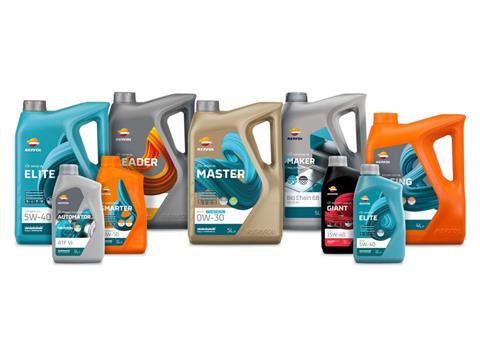
Repsol has launched its new lubricant containers, incorporating 60% mechanically recycled post-consumer plastic.
The new compound, part of the Repsol Reciclex range of sustainable polyolefins, will be used in all 1l, 4l, and 5l lubricant containers and available in five colours for the different product ranges, including engine and transmission oils for cars, motorcycles, and heavy vehicles. With these new containers, the multi-energy company apparently reduces its carbon footprint by 25% compared to previous containers.
Pablo Giner, polyethylene director at Repsol, said: “we are delighted to present this new solution, which will help reduce the carbon footprint by 25% compared to previous packaging. Our Reciclex team has been working to develop a packaging solution that incorporates recycled materials and meets our company’s high durability and performance standards.”
Sebastián Mussini, director of lubricants, aviation, asphalt, and specialties at Repsol, added, “this initiative complements our sustainability strategy, complementing our carbon footprint neutral Master lubricant range we have recently released.” Chemicals and lubricants are Repsol’s two most international businesses, carrying out commercial activity in over 90 countries on five continents.
The company states the lubricants business is a leader in the Iberian Peninsula. As part of its growth strategy, it acquired 40% of the Mexican company Bardahl in 2018 and 2019 and 40% of United Oil, which is based in Singapore and has two manufacturing plants in Indonesia and Singapore.
Similarly, the chemical business and its partner, Ravago, have recently inaugurated a new polypropylene compound plant in Morocco’s Tangier free zone to cater to the automotive industry’s needs, a strategic step to support the international expansion of both companies.
Repsol’s lubricants business aims to reduce the carbon footprint of its products by 30% by 2030, compared to the emissions levels recorded in 2022. Different projects are being developed throughout manufacturing to achieve this goal, including formulation, production, distribution, and packaging.
Repsol’s chemical business aims to produce 10% of its polyolefins as biobased and circular products by 2030, promoting the circular economy. To this end, it has developed its range of Repsol Reciclex polyolefins from mechanical and chemical recycling and bio-based solutions.
Another company incorporating recycled plastic content in its products is Cadbury Australia, which recently signed a deal with Amcor to source around 1000 tonnes of post-consumer recycled plastic, expected to wrap approximately 500 million of its family-sized Dairy Milk chocolate blocks and reduce its reliance on virgin plastics. Building on its reported sourcing of around 30% (on a mass balance basis) of the plastic required to wrap its 160g to 185g Cadbury Dairy Milk family blocks produced in Australia with recycled materials in 2022, the company intends to use around 50% (on a mass balance basis) recycled plastics for its Australian blocks, bars, and pieces.
In the e-commerce field, SEE (formerly Sealed Air) released its BubbleWrap Brand inflatable air pillows at the end of 2023, containing a minimum of 95% recycled plastic content. The pillows are said to contain a mix of 40% post-industrial recycled and 55% post-consumer recycled plastic and are thinner than LDPE inflatable cushions, aiming to cut down on material usage and energy consumption.
If you liked this story, you might also enjoy:
The Brief: How viable is biorecycling for plastics?
Report: How the top brands are progressing on packaging sustainability
The Brief: Using ocean-bound plastic in packaging – how, why and should we?
















No comments yet